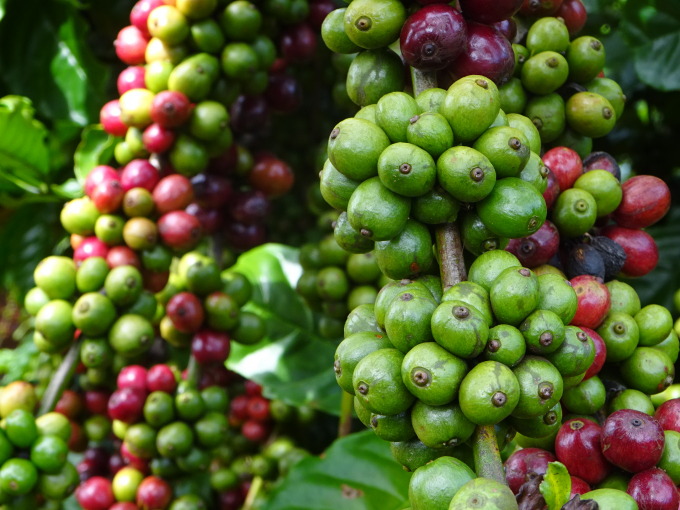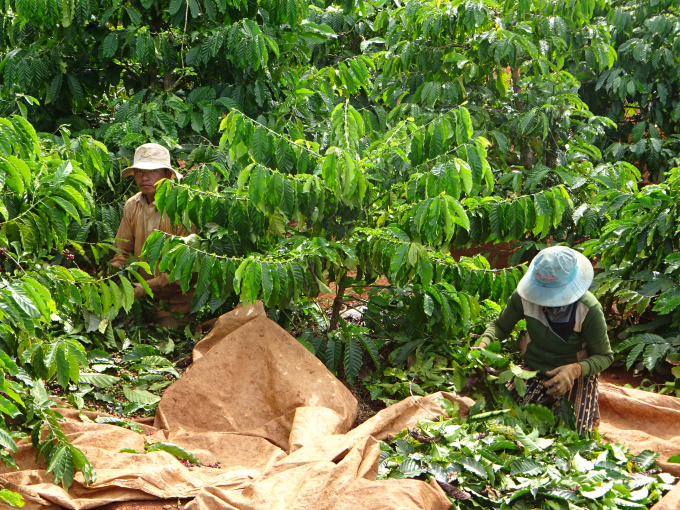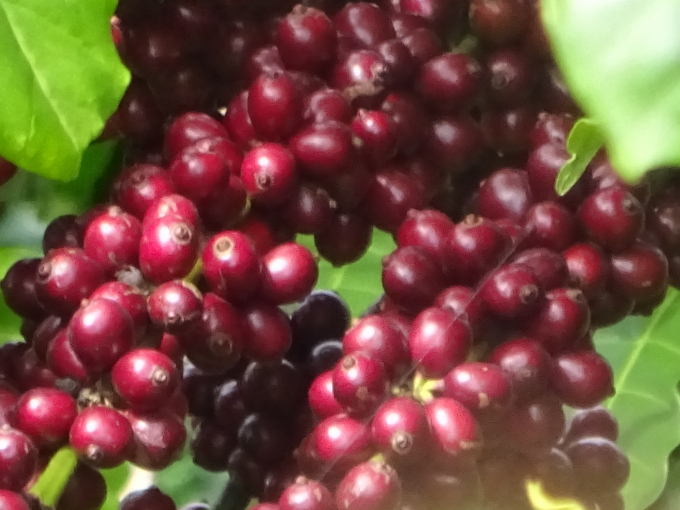May 21, 2025 | 08:11 GMT +7
May 21, 2025 | 08:11 GMT +7
Hotline: 0913.378.918
May 21, 2025 | 08:11 GMT +7
Hotline: 0913.378.918

VnSAT is elevating coffee quality in Central Highlands. Photo: Tuan Anh.
Visiting Quyet Thang cooperative group located in Dak Ha district (Kon Tum province) on the last days of November, all the members here are bustle with harvesting pepper and coffee. Quyet Thang cooperative group has 43 members growing coffee on a 200-hectare plantation.
Nguyen Duy Toan, Quyet Thang cooperative group's leader said the harvest this year is not as good as expected due to much rain. However, coffee bean prices are now soaring to VND42, 000 per kilogram thereby bringing profits to growers.
According to Toan, the cooperative group received great support from the Vietnam Sustainable Agriculture Transformation Project (vnSAT) to grow and produce coffee in a sustainable way over the past years.
Apart from organizing training courses on sustainable model for coffee planting, VnSAT funded 50% of the costs of water saving irrigation installation and the construction of drying yards and warehouses. Particularly, VnSAT invested and put into use 1.7 kilometers of rural road in Ha Mon commune (Dak Ha district).
VnSAT project has created positive change in the rural areas of Dak Ha. In the past when the project was not implemented coffee yields were low. However with the support from VnSAT project the growers have currently understood how to take care, how to fertilize and water the coffee plants properly and effectively.

Dak Ha people are excited as new coffee harvest season comes. Photo: Tuan Anh.
“Previously, the locals felt afraid of replanting old coffee trees but when VnSAT project was launched and created productive coffee plantations many people started to learn and do the same,” Toan said.
Also according to Toan, thanks to VnSAT’s investment the road leading to the coffee plantation was repaired making it convenient for harvesting coffee and reducing transportation costs.
Duong Thi Thanh Luong, Deputy Director of the Board of Management of VnSAT Kon Tum said the project initially improved the people’s awareness of sustainable coffee cultivation over a five-year period. Accordingly, farm households intercropped coffee with fruit trees on coffee ecosystem to diversify their commodities and increase their incomes per one area unit.
“Generally VnSAT has been creating positive change in the people’s awareness and in coffee production in the area. Sustainable coffee cultivation helps to reduce production cost and increase incomes for growers while the impacts on environment are limited, thus human health is ensured. As a result the value of coffee industry in particular and agricultural industry in general is improved,” said Luong.
Ham Rong Agriculture-Commerce and Ecotourism Cooperative based in Pleiku City, Gia Lai province) has been founded for two years. The cooperative got the funding support of VnSAT to adopt water-saving technology on the 50-hectare-coffee plantation in Dak Doa and Chu Se districts. Under the approved plans, VnSAT will continue to provide the cooperative with a fund of VND4.6 billion to construct a 6,000-square-meter drying yard system in the next period.
Especially, VnSAT will spend nearly VND4 billion to construct a 1.8 km road to make transport in the coffee-growing area more convenient. Besides, VnSAT will continue to help with training courses on sustainable coffee production and replanting.

VnSAT has helped to improve the coffee industry in Central Highlands over a five year period. Photo: Tuan Anh.
Lam Quoc Trieu, Director of Ham Rong Cooperative said VnSAT’s sustainable model for coffee planting has benefited not only the growers but also the cooperative and the coffee purchasers thanks to improved traffic and water-saving systems.
Particularly as a participant in VnSAT project the Cooperative will inspire surrounding coffee farmers to adopt sustainable farming methods and practices and thereby increase the value of Vietnamese coffee.
According to the Board of Management of VnSAT Kon Tum, the project has been implemented in 17 communes and towns in the districts of Dak Ha, Dak Glei and Kon Plong. 4,530 households participating in the project have applied sustainable farming methods for 4,126 hectares of coffee plants.
VnSAT Kon Tum has established and strengthened 17 farmers’ organizations including 13 cooperative groups and 4 cooperatives with 1,411 households growing coffee plants on 2,700 hectares.
VnSAT also provided funding for Cong Bang Poko Agricultural Cooperative and Dak Mar cooperative group to improve the preliminary processing system.
VnSAT Kon Tum is now constructing 41.46 kilometers of rural roads in the communes of Ha Mon, Dak La, Ngoc Wang, Dak Ui and Dak Long to make access to coffee growing areas easier.
Translated by Mai Tham

(VAN) Japan's grant aid project contributes to capacity building, promoting organic agricultural production, and fostering sustainable community development in Dong Thap province.

(VAN) For years, the CRISPR-Cas9 genome technology has been reshaping genetic engineering, a precision tool to transform everything from agriculture to medicine.

(VAN) Vietnam aims to become a 'leader' in the region in the capacity and managing effectively soil health and crop nutrition.
![Reducing emissions from rice fields: [Part 1] Farming clean rice together](https://t.ex-cdn.com/nongnghiepmoitruong.vn/608w/files/news/2025/05/05/z6509661417740_a647202949c539012a959e841c03e1d3-nongnghiep-143611.jpg)
(VAN) Growing clean rice helps reduce environmental pollution while increasing income, allowing farmers to feel secure in production and remain committed to their fields for the long term.
/2025/05/19/5136-1-144800_230.jpg)
(VAN) The Nghe An Provincial People's Committee has just approved the list of beneficiaries eligible for revenue from the Emission Reductions Payment Agreement (ERPA) in the North Central region for the year 2025.

(VAN) 14 out of 35 domesticated elephants in Dak Lak province have had their living conditions improved, with 11 of them currently participating in the non-riding elephant tourism model.

(VAN) Muong Nhe Nature Reserve hopes that being upgraded to a national park will lay the foundation for forest protection efforts to be carried out in a systematic, modern, and sustainable manner.